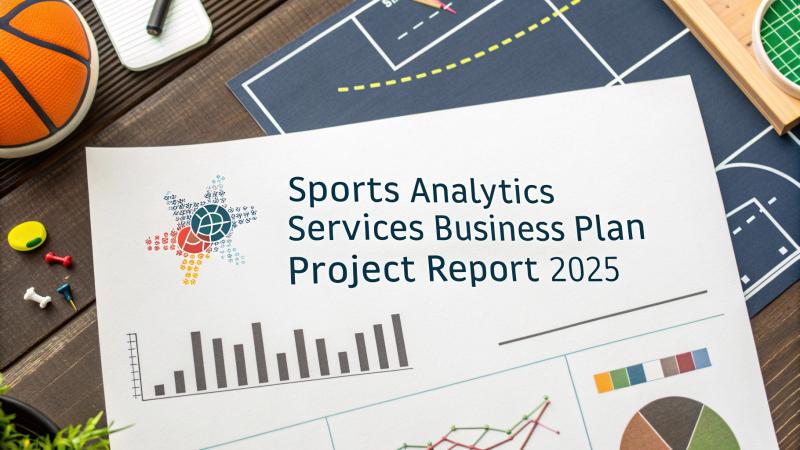Sports Analytics Services Business Plan 2025: Costs, Setup,


Sports Analytics Services Business Plan & Project Report Overview
IMARC Group’s “Sports Analytics Services Business Plan and Project Report 2025” offers a comprehensive framework for establishing a successful sports analytics services business. The critical areas, including market trends, investment opportunities, revenue models, and financial forecasts, are discussed in this in-depth report and are therefore useful resources to entrepreneurs, consultants and investors. Whether evaluating the viability of a new venture or streamlining an existing one, the report gives an in-depth analysis of all the ingredients that make it successful, starting with business formation and profitability over time.
What is a Sports Analytics Services Business?
A Sports Analytics Services (SAS) company provides sports organizations, teams, athletes and sports technology companies with full-service analytics capabilities focused on performance. Analytics services leverage next-generation data acquisition technologies such as wearables, video, computer vision technology, and machine learning algorithms, predictive modeling, real-time performance assessments and decision support systems to deliver sports perceptions to their clients.
Services include player and team performance analysis, injury prediction and management, talent identification and scouting, opponent analysis, sports strategy, training load and biomechanical analysis, fan experience analysis, and performance improvement programs for athletes and organizations committed to using data.
These include performance analysis consultancies, sports data science companies, athlete monitoring companies, and tactical analysis companies who apply advanced statistical modeling, video analysis, wearable technology, machine learning, bespoke dashboards, predictive analytics, and thorough reporting as their main tools.
These include data collection systems, video analysis tools, machine learning-based analysis platforms, cloud infrastructures aligned to sports teams, wearable technology ecosystems, performance monitoring and improvement software, visualization and statistical analysis tools, and data-informed communication and collaboration tools.
Depending on location, these may either be specialized player development analytics firms, team strategy consultancies and sports technology providers, or may provide full-service sports technology analytics solutions to meet the needs specific to multiple sports, levels of competition and organizational interests.
Request for a Sample Report: https://www.imarcgroup.com/sports-analytics-services-business-plan-project-report/requestsample
Sports Analytics Services Business Market Trends and Growth Drivers
Key trends driving the Sports Analytics Services market growth are growing focus on data driven decision making in sports, rising investment in sports technology, increasing recognition of marginal gains as a game changer and growing focus on injury prevention using predictive analytics. These factors have led to growing demand for improving performance through advanced analytics solutions in sports domain. It is supported by wearable technologies, artificial intelligence in sport, video technology for post-performance analytics, performance tracking systems and the desire of sports organizations for evidence-based coaching, efficient talent identification, and competitive intelligence in the new sports technology landscape.
The need for data processing for other sports is driving operators to invest in machine learning infrastructure, platforms for real-time, multi-sport data computing, visualization tools and interfaces to existing Sports Management Systems. Such investment has been expected to improve data analysis results, and business outcomes in general, in the same way as in other sports science, medicine and performance enhancement areas.
Another way to increase financial-risk coverage is to diversify revenue. For example, income may be derived from consulting, software as a service (SaaS), licensing of software algorithms, performance-monitoring portals, software tools for analytics, training and education, long-term advisory retainers, and technology integration services.
Location is important to sport data businesses. Firms located near professional sport organizations, collegiate athletic programs, sports technology business incubators/accelerators and sport science research facilities are more likely to be successful because of the concentration of consistent clients (sport organizations) and brand visibility. Implementing advanced analytics, complying with data privacy legislation, and adhering to the standards set by sporting governing bodies are key to success.
Other factors include rapidly changing sports-tech innovation, requiring constant updates to hardware and software, competition with incumbent analytics providers and analytics departments within client organizations, reliance on client organizations to provide accurate and available data to feed analytics tools, and handling regulations around athlete data privacy and data protection obligations.
In addition to computational resources and analytics software platforms, a successful SAS business requires investment in proprietary analytical models, advanced data visualization tools, as well as dedicated teams of data scientists, sports scientists and domain experts. It should also be supported by strong marketing and branding strategies to promote brand recognition and brand trust, and build long lasting relationships with teams, coaches and athlete management companies. These businesses can contribute to sports performance by delivering perceptions, analytics, and experiences that encourage clients to adopt data-driven strategies to compete effectively.
Report Coverage
The Sports Analytics Services Business Plan and Project Report includes the following areas of focus:
• Business Model & Operations Plan
• Technical Feasibility
• Financial Feasibility
• Market Analysis
• Marketing & Sales Strategy
• Risk Assessment & Mitigation
• Licensing & Certification Requirements
The comprehensive nature of this report ensures that all aspects of the business are covered, from market trends and risk mitigation to regulatory requirements and sports organization-focused client acquisition strategies.
Key Elements of Sports Analytics Services Business Setup
Business Model & Operations Plan
A solid business model is crucial to a successful venture. The report covers:
• Service Overview: A breakdown of performance data collection, statistical analysis services, video breakdown offerings, predictive modeling capabilities, custom dashboard development, injury risk assessment, talent identification systems, and client strategy consultation services offered
• Service Workflow: How each client engagement, data collection protocol, analytical processing, insight generation, visualization development, and client reporting process is managed
• Revenue Model: An exploration of the mechanisms driving revenue across multiple service categories and analytical offerings
• SOPs & Service Standards: Guidelines for consistent analytical quality, data security protocols, client confidentiality practices, and delivery excellence
This section ensures that all operational and client service aspects are clearly defined, making it easier to scale and maintain analytical quality.
Buy Report Now: https://www.imarcgroup.com/checkout?id=43967&method=1911
Technical Feasibility
Setting up a successful business requires proper technical and analytical infrastructure planning. The report includes:
• Location Selection Criteria: Key factors to consider when choosing office locations and target sports markets
• Space & Costs: Estimations for required office space, data center facilities, client meeting areas, and associated costs
• Equipment & Systems: Identifying essential computing infrastructure, analytical software licenses, video analysis tools, and data storage solutions
• Technology & Analytics Setup: Guidelines for creating advanced data processing facilities and client-focused presentation environments
• Utility Requirements & Costs: Understanding the computational power and connectivity necessary to run analytics operations
• Human Resources & Wages: Estimating staffing needs, roles, and compensation for data scientists, sports scientists, analysts, developers, and client service personnel
This section provides practical, actionable insights into the technical and analytical infrastructure needed for setting up your business, ensuring data security and analytical excellence.
Financial Feasibility
The Sports Analytics Services Business Plan and Project Report provides a detailed analysis of the financial landscape, including:
• Capital Investments & Operating Costs: Breakdown of initial and ongoing investments
• Revenue & Expenditure Projections: Projected income and cost estimates for the first five years
• Profit & Loss Analysis: A clear picture of expected financial outcomes
• Taxation & Depreciation: Understanding tax obligations and technology depreciation
• ROI, NPV & Sensitivity Analysis: Comprehensive financial evaluations to assess profitability
This in-depth financial analysis supports effective decision-making and helps secure funding, making it an essential tool for evaluating the business’s potential.
Market Insights & Strategy
Market Analysis
A deep dive into the sports analytics services market, including:
• Industry Trends & Segmentation: Identifying emerging trends and key market segments across professional sports analytics, collegiate athletics services, individual athlete monitoring, amateur sports development, and sports technology integration
• Regional Demand & Cost Structure: Regional variations in sports analytics adoption and cost factors affecting service operations
• Competitive Landscape: An analysis of the competitive environment including established sports data companies, independent analytics consultancies, in-house team analytics departments, and sports technology platforms
Profiles of Key Players
The report provides detailed profiles of leading players in the industry, offering a valuable benchmark for new businesses. It highlights their strategies, service offerings, technological capabilities, and market positioning, helping you identify strategic opportunities and areas for differentiation.
Capital & Operational Expenditure Breakdown
The report includes a comprehensive breakdown of both capital and operational costs, helping you plan for financial success. The detailed estimates for infrastructure development, technology, and operating costs ensure you’re well-prepared for both initial investments and ongoing expenses.
• Capital Expenditure (CapEx): Focused on office space setup and design, high-performance computing systems, analytical software licenses, video analysis platforms, data storage infrastructure, client presentation facilities, and proprietary algorithm development
• Operational Expenditure (OpEx): Covers ongoing costs like staff salaries, software subscription fees, cloud computing costs, marketing expenses, professional development, client acquisition costs, and technology maintenance
Financial projections ensure you’re prepared for cost fluctuations, including adjustments for technology upgrade cycles, software licensing renewals, talent acquisition costs, and competitive market pressures over time.
Profitability Projections
The report outlines a detailed profitability analysis over the first five years of operations, including projections for:
• Total revenue from consulting services, software subscriptions, and technology licensing, expenditure breakdown, gross profit, and net profit
• Profit margins for each revenue stream and year of operation
• Revenue per client projections and market penetration growth estimates
These projections offer a clear picture of the expected financial performance and profitability of the business, allowing for better planning and informed decision-making.
Request For Customization: https://www.imarcgroup.com/request?type=report&id=43967&flag=E
Our expertise includes:
• Market Entry and Expansion Strategy
• Feasibility Studies and Business Planning
• Company Incorporation and Sports Service Setup Support
• Regulatory and Licensing Navigation
• Competitive Analysis and Benchmarking
• Industry Partnership Development
• Branding, Marketing, and Sports Organization-Focused Client Strategy
About Us
IMARC Group is a leading global market research and management consulting firm. We specialize in helping organizations identify opportunities, mitigate risks, and create impactful business strategies.
Contact Us:
IMARC Group
134 N 4th St. Brooklyn, NY 11249, USA
Email: [email protected]
Tel No:(D) +91 120 433 0800
United States: (+1-201971-6302)
This release was published on openPR.
link





